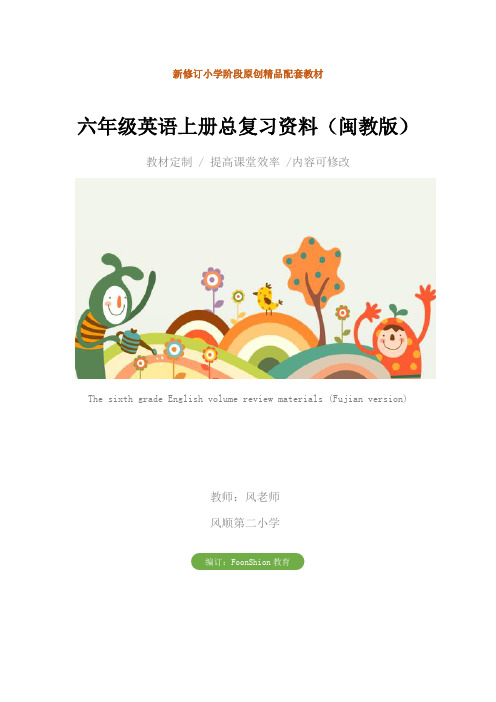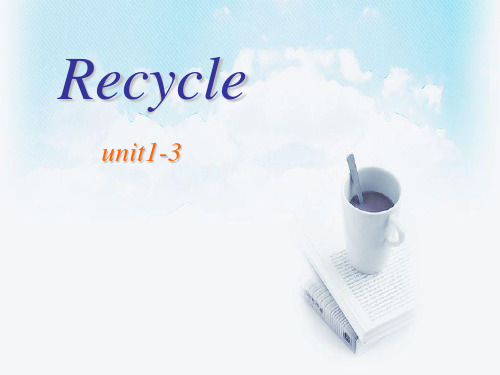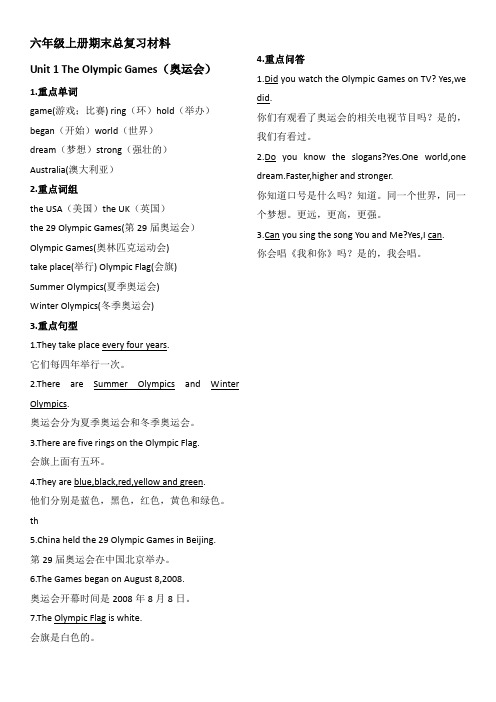小学六年级英语上册总复习
小学英语总复习六年级上册第一二单元知识点

小学英语总复习六年级上册UNIT1--UNIT2知识点Unit 1 How do you go to school?主要单词:by plane 坐飞机 by ship 坐轮船 on foot步行 by bike 骑自行车 by bus 坐公共汽车 by train 坐火车 traffic lights交通灯 traffic rules交通规则 Stop at a red light 红灯停 Wait at a yellow light 黄灯等 Go at a green light 绿灯行主要句子:How do you go to school?你怎么去上学?Usually I go to school on foot. Sometimes I go by bus.通常我步行去上学。
有时候骑自行车去。
How can I get to Zhongshan Park ?我怎么到达中山公园?You can go by the No. 15 bus.你可以坐15路公共汽车去。
知识点:1、There are many ways to go somewhere.到一个地方去有许多方法。
这里的ways一定要用复数。
因为there are是There be句型的复数形式。
2、get to到达.关本单元我们还要学习与get相关的短语:get on 上车 get off下车3、on foot 步行乘坐其他交通工具大都可以用介词by…, 但是步行只能用介词on 。
4、go to school的前面绝对不能加the,这里是固定搭配。
5、USA 和 US 都是美国的意思。
另外America也是美国的意思。
6 go to the park前面一定要加the.如果要去的地方有具体的名字,就不能再加the , 如果要去的地方没有具体名字,由要在前面加the. go to school除外。
7、How do you go to …?你怎样到达某个地方?如果要问的是第三人称单数,则要用:How does he/she…go to …?8、反义词:get on(上车)---get off(下车) near(近的)—far(远的)fast(快的)—slow(慢的) because(因为)—why(为什么)same(相同的)—different(不同的)9、近义词:see you---goodbye sure---certainly---of course10、频度副词:always 总是,一直 usually 通常 often经常 sometimes 有时候 never 从来不11、The traffic lights are the same in every country. There are always three lights: red, yellow and green. 每个国家的交通灯是一样。
小学:六年级英语上册总复习资料(闽教版)

新修订小学阶段原创精品配套教材六年级英语上册总复习资料(闽教版)教材定制 / 提高课堂效率 /内容可修改The sixth grade English volume review materials (Fujian version)教师:风老师风顺第二小学编订:FoonShion教育六年级英语上册总复习资料(闽教版)6a unit onewords: vacation stay the summer palace the white house again cousin learnsentences: 1,where were you in the summer vacation?—i went to the usa\went to shanghai\went to shandong\stayed at home\stayed in china.—i visited the white house\took some photos\climbed a mountain\did my homework and played the piano\visited the great wall.2,did you have a good time in the summer vacation?—sure.in the morning i learned english.in the afternoon i swam in the sea.in the evening i watched tv\played basketball\played chess\played the piano\running….grammer:学习单词及动词短语,并结合句型进行操练。
unit twowords: housework past made(make) clothes every messy watersentences: 1, do you often do housework athome,children?—yes,i often help my mother.do you clean the table after dinner?—yes, i do. no, i don’t.2, in the past my mother made my bed. new i make my bed.in the past my grandma washed my clothes.new i wash my clothes.in the past my mother cleaned my room. new i clean my room.3, did wang tao make his bed in the past?—yes, he did.\no, he didn’t.does he make his bed new?—yes, he does.\no, he doesn’t.grammer: 学习单词及有关短语,对比过去做和现在做的动词形式(一般过去时和一般现在时的动词形式区别),注意一般疑问句中do\does\did的使用及回答,复习p18-19课本练习。
人教PEP小学六年级上册英语一至三单元总复习

八、读一读,判断正误(10分) There are four people in Mr Black’s family . They’re Mr Black , Mrs. Black , their daughter Amy and their son Sam . Amy has got a bike ,she goes to school by bike . Sam hasn’t got a bike , he goes to school by bus . Mr Black goes to work by car . Mrs. Black is a teacher , and the home is near the school . She goes to work on foot . ( F ) 1. There are five people in the family . ( T ) 2. Amy goes to school by bike . ( F ) 3.Sam goes to school by bike , too . ( F ) 4. Mr Black goes to work by bus . ( F ) 5. Mrs Black isn’t a teacher .
It’s next to the __p_o_s_t_o_ff_i_c_e.
Let’s guess
Where is the__p_o_s_t _o_ff_i_c_e_? It’s next to the __________.
It’s next to the ___s_c_ie_n_c_e__m_u_s_e_u.m
Bye ! Let’s follow the traffic rules!
It’s behind the post office.
六年级上册英语总复习知识点

六年级上册英语总复习Unit 1on foot(走路) by bike(骑自行车) by bus(乘公共汽车) by train(乘火车) by plane乘飞机by ship乘轮船by subway乘地铁how(怎样) go to school(上学) traffic(交通) traffic light(交通灯) traffic rule(交通规那么)bus stop(停车站) wait(等待) stop 停get to(到达)Unit 2library(图书馆) post office(邮局) hospital(医院) cinema(电影院) bookstore(书店) science museum科学博物馆supermarket超级市场bank 银行excuse me 对不起where(,到哪里) please(请) next to(与…相邻) turn right (向右转) turn left(向左转) go straight(笔直走) north 北south 南east 东west 西then (然后)Unit 3today 今天tomorrow明天tonight今晚weekend 周末next week(下周) this morning(今天上午) this afternoon(今天下午) this evening (今天晚上) take a trip去旅行read a magazine读杂志go to the cinema 去电影院visit grandparents看望祖父母play sports 做运动read books读书clean my room 清扫房间theme park 主题公园the Great Wall 长城comic book(漫画书) post card(明信片) newspaper(报纸) magazine杂志dictionary字典buy(购置)Unit 4hobby(爱好) ride --riding a bike(骑自行车) dive--diving(跳水) play -playing the violin(拉小提琴) make-making kites(制作风筝) collect-collecting stamps(集邮) live –lives(居住) teach--teaches(教) go--goes(去) watch--watches(看) read--reads(读,看)Unit 5singer(歌唱家,歌手) writer(作家) actor(男演员) actress(女演员) artist(画家) TV reporter(电视台记者) student学生teacher 教师dancer 舞者doctor 医生nurse护士driver司机farmer农民engineer(工程师) accountant(会计) policeman(男警察) salesperson(销售员) cleaner(清洁工) work(工作)Unit 6rain(雨) cloud (云) sun(太阳) stream(河,溪) vapour水蒸气come from(来自,从…来) seed(种子) soil(土壤) sprout (苗,芽) plant(植物,种植) should (应该) then(然后)do you go to school? 你怎样去学校的?--My home is near. Usually I go to school on foot. Sometimes I go by bike.很近。
(完整)六年级上册英语总复习知识要点(1-3单元)

六年级上册英语总复习知识要点(1-3单元)Unit1Howdoyougothere?单词和短语:.byplane乘飞机 2.onfoot步行 3.bybike骑自行车4.bybus乘公共汽车5.bytrain乘火车6.stop停7.wait等8.trafficlight交通灯9.trafficrule交通规则10.getto 到达句型:.Howdoyougotoschool?你如何去上学?Igotoschoolonfoot.我步行去上学。
2.Howdoesmarygotoschool?玛丽如何去上学?Shegoestoschoolbybike.她骑自行车去上学。
3.HowcanIgettoZhongshanpark?我怎样才能到中山公园?youcangobyNo.15bus.你可以乘15路公交车。
4.Stopataredlight.=Redlightmeansstop.红灯停。
5.waitatayellowlight.=yellowlightmeanswait.黄灯等待。
6.Goatagreenlight.=Greenlightmeansgo.绿灯行7.Inchina,driversdriveontherightsideoftheroad.在中国,司机们靠右侧行驶。
(在美国,澳大利亚,香港,新西兰也是。
)Unit2whereisthesciencemuseum?单词和短语:.postoffice邮局 2.hospital医院 3.cinema电影院4.bookstore书店5.sciencemuseum科学博物馆6.bank银行7.library图书馆8.supermarket超市9.excuseme对不起,打扰一下10.apairof一双11.nextto与…相邻12.afterschool放学以后13.north北14.south南15.east 东16.west西17.turnright向右转18.turnleft向左转19.gostraight直行20.lookfor寻找21.please请句型:.whereisthecinema,please?请问,电影院在哪里?It’snexttothehospital.与医院相邻。
闽教版小学英语六年级上册期末总复习材料

六年级上册期末总复习材料Unit 1 The Olympic Games(奥运会)1.重点单词game(游戏;比赛) ring(环)hold(举办)began(开始)world(世界)dream(梦想)strong(强壮的)Australia(澳大利亚)2.重点词组the USA(美国)the UK(英国)the 29 Olympic Games(第29届奥运会)Olympic Games(奥林匹克运动会)take place(举行) Olympic Flag(会旗)Summer Olympics(夏季奥运会)Winter Olympics(冬季奥运会)3.重点句型1.They take place every four years.它们每四年举行一次。
2.There are Summer Olympics and Winter Olympics.奥运会分为夏季奥运会和冬季奥运会。
3.There are five rings on the Olympic Flag.会旗上面有五环。
4.They are blue,black,red,yellow and green.他们分别是蓝色,黑色,红色,黄色和绿色。
th5.China held the 29 Olympic Games in Beijing.第29届奥运会在中国北京举办。
6.The Games began on August 8,2008.奥运会开幕时间是2008年8月8日。
7.The Olympic Flag is white.会旗是白色的。
4.重点问答1.Did you watch the Olympic Games on TV? Yes,we did.你们有观看了奥运会的相关电视节目吗?是的,我们有看过。
2.Do you know the slogans?Yes.One world,one dream.Faster,higher and stronger.你知道口号是什么吗?知道。
六年级上册英语复资料

六年级上册英语复资料以下是六年级上册英语复习资料,包括一些重点词汇、短语和句子,以及一些常见的语法知识点。
重点词汇:1. subject 科目2. math 数学3. science 科学4. social studies 社会研究5. English 英语6. Chinese 语文7. music 音乐8. art 美术9. physical education 体育10. library 图书馆常见短语:1. have a good day 过得愉快2. see you later 待会儿见3. have a good time 过得开心4. let me know 让我知道5. have a look 看一看6. have a seat 请坐7. what about you 你呢8. I don’t know 我不知道9. I think so 我认为如此10. I’m not sure 我不能确定常见句子:1. What’s your favorite subject? 你最喜欢的科目是什么?2. I like math because it’s fun. 我喜欢数学因为它很有趣。
3. Do you like science? 你喜欢科学吗?4. Yes, I do. 是的,我喜欢。
5. No, I don’t. 不,我不喜欢。
6. What’s your favorite sport? 你最喜欢的运动是什么?7. My favorite sport is basketball. 我最喜欢的运动是篮球。
8. When do you usually get up? 你通常什么时候起床?9. I usually g et up at 7 o’clock. 我通常在7点钟起床。
10. How many hours do you sleep every night? 你每晚睡多少小时?语法知识点:1. 现在进行时:表示正在进行的动作或状态,结构为“be动词+动词ing”。
2023年小学六年级英语上册总复习资料

2023年小学六年级英语上册总复习资料一、听力练
- 学生可以通过听录音来提高听力技能。
- 可以使用英语歌曲和儿童故事CD来训练听力。
- 在听力练中,强化对标准发音和语速的理解。
二、口语练
- 学生可以通过与同学进行英语口语对话来提高口语表达能力。
- 参加英语角活动,积极参与英语对话练。
- 创造外语环境,多与家人和朋友进行英语交流。
三、阅读理解
- 学生可以通过大量阅读英语文章来提高阅读理解能力。
- 多阅读英语故事书、儿童杂志和英语新闻。
- 注意理解关键词,提炼文章主旨。
四、写作训练
- 学生可以通过写作来提升英语写作能力。
- 练写日记、写信、写作文等。
- 注意语法、拼写和表达的准确性。
五、语法规则
- 学生需要掌握基本的英语语法规则。
- 研究动词的时态、主谓一致、名词单复数等。
- 参考英语语法书籍进行研究和巩固。
六、单词记忆
- 学生需要积累和记忆大量的英语单词。
- 利用单词卡片、应用程序等进行记忆。
- 多进行单词拼写和词汇运用的练。
以上是2023年小学六年级英语上册总复习的一些资料和建议,希望对学生们复习英语有所帮助。
祝大家学业进步!。
- 1、下载文档前请自行甄别文档内容的完整性,平台不提供额外的编辑、内容补充、找答案等附加服务。
- 2、"仅部分预览"的文档,不可在线预览部分如存在完整性等问题,可反馈申请退款(可完整预览的文档不适用该条件!)。
- 3、如文档侵犯您的权益,请联系客服反馈,我们会尽快为您处理(人工客服工作时间:9:00-18:30)。
小学英语总复习六年级上册知识点Unit 1How do you go to school?主要单词:by plane坐飞机by ship坐轮船on foot步行by bike骑自行车by bus坐公共汽车by train坐火车traffic lights交通灯traffic rules交通规则Stopat a red light红灯停Waitat a yellow light黄灯等Goat a green light绿灯行主要句子:How do you go to school?你怎么去上学?Usually I go to school on foot. Sometimes I go by bus.通常我步行去上学。
有时候骑自行车去。
How can I get to Zhongshan Park ?我怎么到达中山公园?You can go by the No. 15 bus.你可以坐15路公共汽车去。
知识点:1、There are manywaysto go somewhere.到一个地方去有许多方法。
这里的ways一定要用复数。
因为there are是There be句型的复数形式。
2、get to到达.本单元我们还要学习与get相关的短语:get on上车get off下车3、on foot步行乘坐其他交通工具大都可以用介词by…,但是步行只能用介词on。
4、go to school的前面绝对不能加the,这里是固定搭配。
5、USA和US都是美国的意思。
另外America也是美国的意思。
6go to the park前面一定要加the.如果要去的地方有具体的名字,就不能再加the ,如果要去的地方没有具体名字,由要在前面加the. go to school除外。
7、How do you go to …?你怎样到达某个地方?如果要问的是第三人称单数,则要用:How does he/she…go to …?8、反义词:get on(上车)---get off(下车)near(近的)—far(远的)fast(快的)—slow(慢的)because(因为)—why(为什么)same(相同的)—different(不同的)9、近义词:see you---goodbyesure---certainly---of course10、频度副词:always总是,一直usually通常often经常sometimes有时候never从来不Unit 2Where is the science museum?主要单词:library图书馆post office邮局hospital医院cinema电影院bookstore书店science museum科学博物馆turn left向左转turn right向右转go straight直行north北south南east东west西主要句子:Where is the cinema, please?请问电影院在哪里?It’s next to the hospital.它与医院相邻。
Turn left at the cinema, then go straight. It’s on the left.在电影院向左转,然后直行。
它在左边。
知识点:1、near表示在附近,next to表示与…相邻。
它的范围比near小。
2、电影院在英语中称为“cinema”,在美语中称为movie theatre.3、for表示持续多长时间,当表示做某事多长时间都要用for.如:Walk east for 5minutes.4、当表示某个地方在另一个地方的哪一方向时,要用介词of。
如:the hospital is eastthe cinema.医院在电影院的东边。
5、表示在哪儿转时,用介词at。
如:Turn left at the bank。
在银行左转。
6、find表示“找到”,强调找的结果。
Look for表示“寻找”,强调找的过程。
7、英文的书信与中文的书信不完全一样:开头:英语是在人称后面加逗号,中文是加冒号。
正文:英语是顶格写,中文要空两个格。
结尾:英语的落款与人名是顶格而且是分开写的。
中文则是另起一行,放在一起且稍靠后一点儿的地方。
8、近义词:bookstore——bookshop书店go straight——go down直行after school——after class放学后9、反义词或对应词:here (这里)---there(那里)east(东)---west(西)north(北)---south(南)left(左)---right(右)get on (上车)---get off(下车)10、in the front of…表示在…的前面,是指在该地方的范围内,in front of而则表示在该地方的范围外。
如:in front of our classroom是指在教室的外面而且在教室的前面。
而in the front of classroom则是指在教室里的前面。
11. be far from…表示离某地远. be可以是am , is ,are。
如:I am far from school now.我现在离学校很远。
My home is not far from school.我家离学校不远。
Unit 3 What are you going to do ?主要单词:this morning今天上午this afternoon今天下午this evening今天晚上next week下周tomorrow明天tonight今晚post card明信片comic book漫画书newspaper报纸主要句子:What are you going to do on the weekend?你周末打算做什么?I’m going to visit my grandparents this weekend.这个周末我打算去看望我的外祖父母。
Where are you going this afternoon?你今天下午打算去哪里?I’m going to the bookstore.我打算去书店。
What are you going to buy?你打算去买什么?I’m going to buy a comic book.我打算去买一本漫画书。
知识点:1、What are you going to do?你想做什么?询问他人在未来的打算。
Be going to后面要跟动词的原形。
2、this evening和tonight的区别:this evening指的是今天晚上睡觉以前的时间,一般指晚上十二点以前。
而tonight指的是今晚,一般是指一整晚的时间,通宵。
3、部分疑问代词的意义与用法:(1)What什么。
用来问是什么,做什么,叫什么,什么样等等。
如:What is your name?你的名字叫什么?What is your father?你爸爸是干什么的?What is your hobby?你的爱好是什么?What is your favourite food?你最喜爱的食物是什么?What’s your math teacher like?你的数学老师长得什么样子?(2)Where ,在哪里,到哪里。
用来问地点。
如:Where are you from?你从哪里来?Where are you going to ?你打算去哪里?Where is my ruler?我的尺子在哪里?(3)When,什么时候。
用来问时间。
如:When is your birthday?你的生日是什么时候?When are you going to ?你打算什么时候去?When do you go to school?你什么时候去上学?(4)what time几点了。
用来问具体的时间,如:What time is it?现在几点了?(5)What colour什么颜色。
用来问物体的颜色。
如:What colour is your schoolbag?你的书包是什么颜色的?(6)What kind of什么种类。
用来问类别。
如What kind of fruit do you like?你最喜欢哪一种水果?(7)who谁。
用来问人物是谁。
如:Who is your English teacher ?你的英语老师是谁?Who’s that man?那个男人是谁?(8)whose谁的。
用来问物体的主人是谁?如:Whose pencil is this?这是谁的铅笔?Whose bike is blue?谁的自行车是蓝色的?(9)which哪一个。
用来问具体的哪一个。
如:Which season do you like best?你最喜欢哪个季节?Which pencil is ken’s? the long one or the short one?哪只铅笔是Ken的?长的那支还是短的那支?(10)how怎样?用来问身体状况,或者事情的状况,对事件的看法等。
如:How are you?你好吗?How is your mother?你妈妈好吗?How about you?你呢?(11)how many多少个。
用来问有多少个,后面要跟名词的复数形式。
如:How many books do you have?你有多少本书?How many kites can you see?你能看见多少只风筝?(12)how much多少钱。
用来问物体的价钱。
如:How much are they?他们多少钱?How much is your schoolbag?你的书包多少钱?(13)how old几岁。
用来问年龄。
如How old are you ?你几岁了?How old is your father?你爸爸多大了?(14)why为什么。
用来问原因,一般要用because来回答。
如:why do you like spring?你为什么喜欢春天?Because I can fly kites.国为我可以放风筝。
(15)how long多长(16)how tall多高4、I want to be…我想成为…表示理想。
Unit 4I have pen pal1、动词变为动名词的规则:动词变为动名词,即是动词加ing。
一般要遵循以下三条规则:(1)一般情况下,在动词的后面直接加ing。
如:play—playingread—readingdo—doinggo—going(2)以不发音的字母e结尾的动词,要去掉不发音的字母e,再加ing。
如:write—writingride—ridingmake—makingdance—dancing(3)以单元音加单辅音结尾的重读闭音节,要双写最后一个辅音字母,再加ing。
